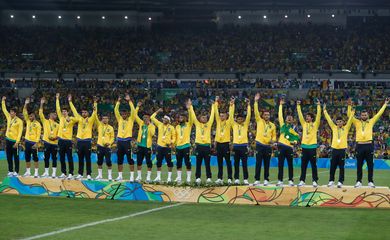Rio Olympics closing ceremony: Rain, joy and carnival




Rio de Janeiro said farewell to hosting the Olympics on Sunday (Aug. 21) evening at the Maracanã stadium.
At a ceremony that reinforced its best and crossed its borders to speak of art and national culture, Rio de Janeiro said farewell to hosting the Olympics on Sunday (Aug. 21) evening at the Maracanã stadium. The show, designed to highlight the Brazilian creativity and ability to create with our own hands, lasted two and half hours and had a tone of celebration and reconciliation.
Weather conditions were not the best, with rain, cold and strong winds during almost the whole ceremony.
Santos Dumont
The character that divided Brazil and USA during the opening ceremony, Santos Dumont, showed up again at the closing ceremony. Played by actor Tuca Andrade, he checked in a wristwatch—one of his inventions—that it was time to start the party.
Dozens of dancers formed in the shape of some of Rio de Janeiro postcards, like the Lapa Arches, Christ the Redeemer, and the Sugarloaf Mountain. In total, 3,000 people were cast for the show, with 300 professionals dancers and 2,700 volunteer dancers. The performance was directed by Bryn Walters, one of the leading world experts in mass choreography for large events and ceremonies. He directed the Athens 2004 and London 2012 opening ceremonies.
Brazil’s national anthem was played by drumbeat and sung by a chorus of children, representing each star of the country’s flag, projected onto arena floors.
After that, athletes began to march out of the stadium, in a much more informal and relaxed atmosphere than on August 5. Competitors entered the arena in a single row formed by the flag bearers, at a large party paced by electronic music, and Brazil’s styles—repente and frevo.

The lace weavers tradition was noted to the sound of the traditional song "Mulher Rendeira” [Lacemaker Woman], sung by Ganhadeiras de Itapuã.
Handwork
Next, the performers told the history of Brazilian popular art in its several artistic expressions and crossed the borders of the host city. The rock art found in Serra da Capivara National Park in Piauí state came alive with choreographed movements. During the so-called "memory time," Brazilian singer Arnaldo Antunes recited his poem "Saudade," evoking the word that only exists in Portuguese, and means longing.
The lace weavers tradition was noted to the sound of the traditional song "Mulher Rendeira” [Lacemaker Woman], sung by Ganhadeiras de Itapuã, a group that preserves old tradition in Salvador neighborhood. Huge projections of intricate lacework were thrown across the stadium floor. Then, Grupo Corpo, a contemporary dance troupe, put on part of “Parabelo,” one of its shows, with a forró rhythm.
The crowd immediately rose in the first chords of "Asa Branca", one of Luiz Gonzaga’s best known forró song, and bopped along to it in the stands. In honor of master Vitalino and his sculptures, the dancers gave way to “clay people” and performed forró steps.

There were loud boos for Rio mayor Eduardo Paes(left) as handing over the Olympic flag to the governor of Tokyo, Yuriko Koike.
Boos
Following an Olympic tradition, the medalists of the men's marathon were crowned during the ceremony, awarding the last medals of the games. The gold medal was given to Kenyan Eliud Kipchoge, the silver to Ethiopian Feyisa Lilesa and the bronze to US Galen Rupp. New members of the IOC’s athlete’s commission were introduced; the crowd roared to Russian pole vaulter Yelena Isinbayeva.
After recognizing the contribution of Rio 2016 volunteers, in which singer Lenine played a special version of his song “Jack Soul Brasileiro,” Greece’s flag was raised and the Greek anthem was sung for the Olympic flag.
There were loud boos for Rio mayor Eduardo Paes as handing over the Olympic flag to the governor of Tokyo, Yuriko Koike.

In the end, the japanese made the invitation, “See you in Tokyo.”
Oriental touch
The 2020 hosts also indicated what they want to do in Tokyo. The Japanese presentation began with its national anthem and a light show, with geometric shapes, traditional drums (Taikos) and video game culture.
The crowd cheered when video game character Mario left the screen and showed up in the middle of the arena. In fact, it was Japanese Prime Minister Abe Shinz , dressed as the famous Nintendo game character.
The Japanese also thanked expectators using a projection with the word "arigato" in many languages, expressing their gratitude to the world for the solidarity and support provided after the earthquake that devastated the country in 2011. In the end, they made the invitation, “See you in Tokyo.”
Flame goes out
A wail echoed from the stands at the moment Thomas Bach declared the Games had ended. While singer Mariene Castro sang the song “Pelo tempo que durar” [for as long as it lasts], from singers Marisa Monte and Adriana Calcanhotto, amid driving rain falling upon the pyre and extinguishing the flame.
The last message was renovation. A large tree sculpture made of rope was hoisted in the middle of the arena amid colorful representation of flora, strengthening the beginning of a new cycle.
Then Maracanã turned into a carnival show with the arrival of the carnival street party “Cordão da Bola Preta” and samba school members, under carnival marchinha rhythms playing "Cidade Maravilhosa,” anthem of Rio de Janeiro city.
The crowd stood up to sing the marchinhas that take the streets during carnival. The party was complete with the arrival of a carnival floats, inviting athletes to gather in the field and watch the fireworks. They just forgot to announce that the party was over: the crowd, athletes, and volunteers continued dancing to the sound of samba played on the speakers, as if the Games were just beginning.
Translated by Amarílis Anchieta
Fonte: Rio Olympics closing ceremony: Rain, joy and carnival




